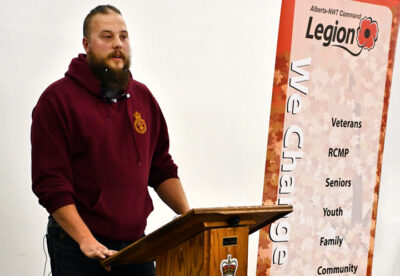Fireteam Partner Check-In being held for veterans on 9/11 anniversary
By Trevor Busch - LETHBRIDGE HERALD on September 10, 2021.
 Brandon Gorham, sergeant-at-arms for the Coalhurst Legion, speaks to media on Thursday about Sept. 11's Fireteam Partner Check-In at the Lethbridge Legion. Herald photo by Trevor Busch
Brandon Gorham, sergeant-at-arms for the Coalhurst Legion, speaks to media on Thursday about Sept. 11's Fireteam Partner Check-In at the Lethbridge Legion. Herald photo by Trevor BuschLETHBRIDGE HERALDtbusch@lethbridgeherald.com
In conjunction with honouring the 20th anniversary of the 9/11 attacks, on Saturday the Lethbridge Legion is hosting its first annual Fireteam Partner Check-In for veterans and their families.
Held in partnership with the Coalhurst Legion, the event is meant to be a “health check” for veterans, spouses, RCMP veterans, and active members of the police and military where they can come to connect, have a meal, and relax while honouring service and sacrifice to the nation.
“We decided to do an annual event – hopefully encapsulating every single September 11th going forward – this year being the very notable date of the 20th anniversary of September 11th, as well as Canada’s subsequent mission in Afghanistan for 13 years,” said Brandon Gorham, sergeant-at-arms for the Legion’s Coalhurst branch, and one of the organizers of the event.
The Fireteam Partner Check-In goes from 2-5 p.m. in the Lethbridge Legion’s Memorial Hall at their Mayor Magrath Drive S. location. A short memorial service will take place at 2:20 p.m.
Recent events witnessed in Afghanistan have been difficult for many Canadians, but especially veterans and their families, and those who served in a variety of operations overseas.
“This year, in particular, creates a very sombre note for recent events that happened in Afghanistan, which is bringing a lot of those veterans to question was it worth it? Was their sacrifices worth it? Was the mission a success?” said Gorham. “I’m hoping to create this event so that veterans have a place to ask those questions, and hopefully find some answers.”
Guest speakers at the event will include Mark E. Meincke (Operation Tango Romeo Podcast) and Shelagh Cox and Candace Driscoll with MFRC (Military Family Resource Centres). There will also be a presentation by OSISS Peer Support (Operational Stress Injury Social Support).
“The idea was to have other veterans, as peers, actually walk guys through,” said Gorham. “And it’s just show up for coffee, have a check in, see how everybody’s doing, if you don’t want to talk about your PTSD that’s completely fine. If you just want to talk about the weather, or COVID, or whatever, go for it. It’s just an opportunity to get guys out of their house so that they feel like they have that connection.”
Gorham, an Afghan veteran who suffers from PTSD himself, said mental health problems that present for individuals with the disorder can often lead to physical health problems as well.
“Mental health is just as important as physical health is. Many of the mental health issues you’re suffering will have physical problems that sort of manifest as a result. For example, I have PTSD, and there’s days I can’t even leave the house because I don’t want to be in public, I don’t want to see people, and that actually manifests as actual anxiety, actual panic attacks, actual hyper-vigilance. Those kind of lead into actual physical problems that start manifesting as a result, for example, bruxism or sleep apnea. So because of mental health injury, you get a lot of physical injuries that start manifesting as a result.”
-2




